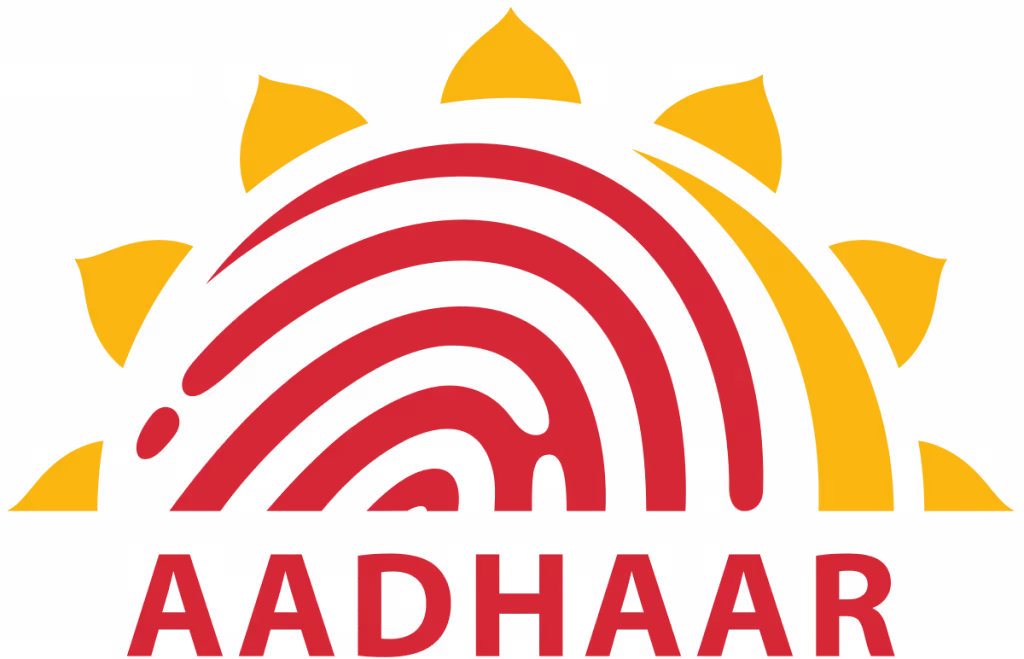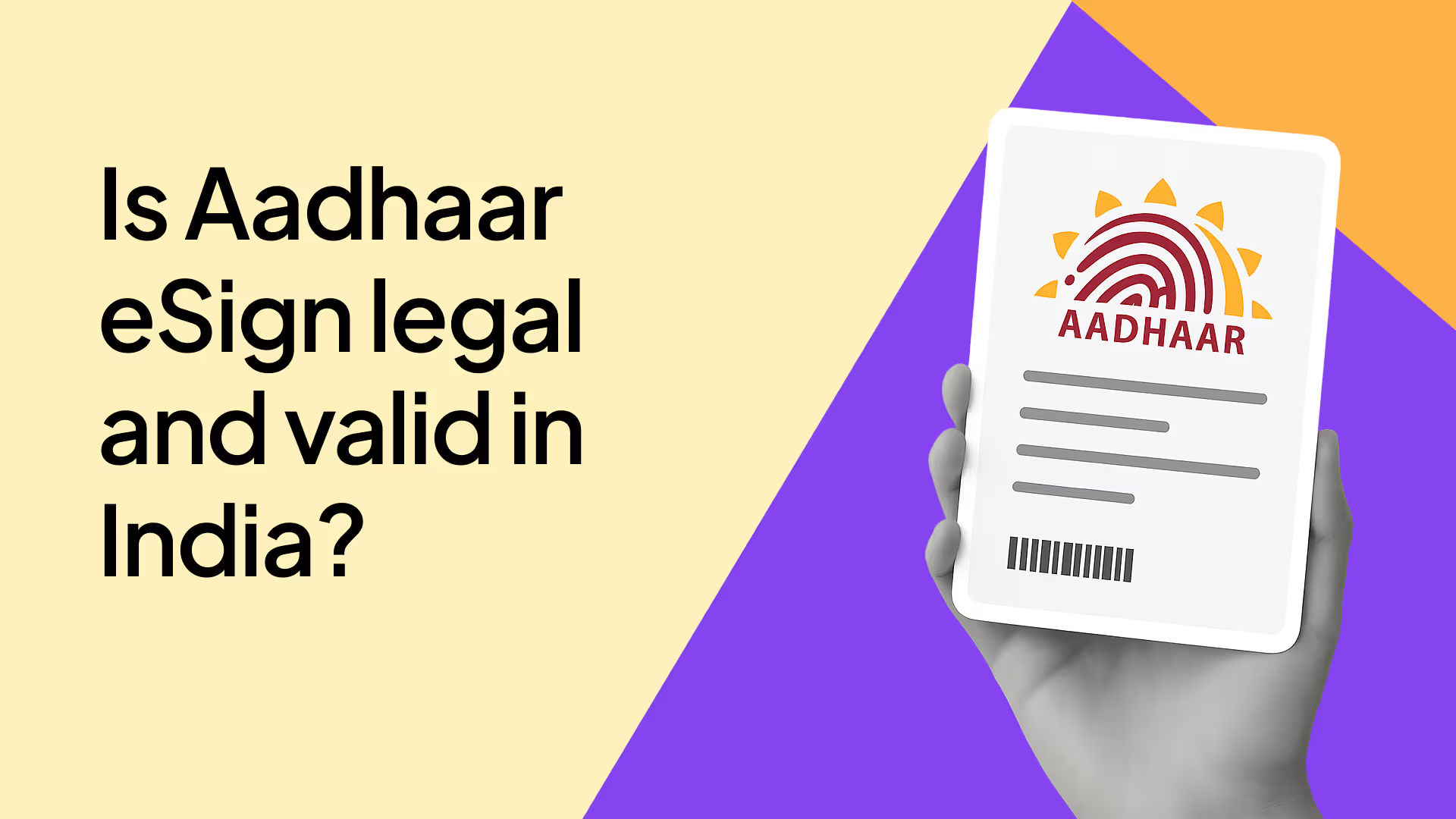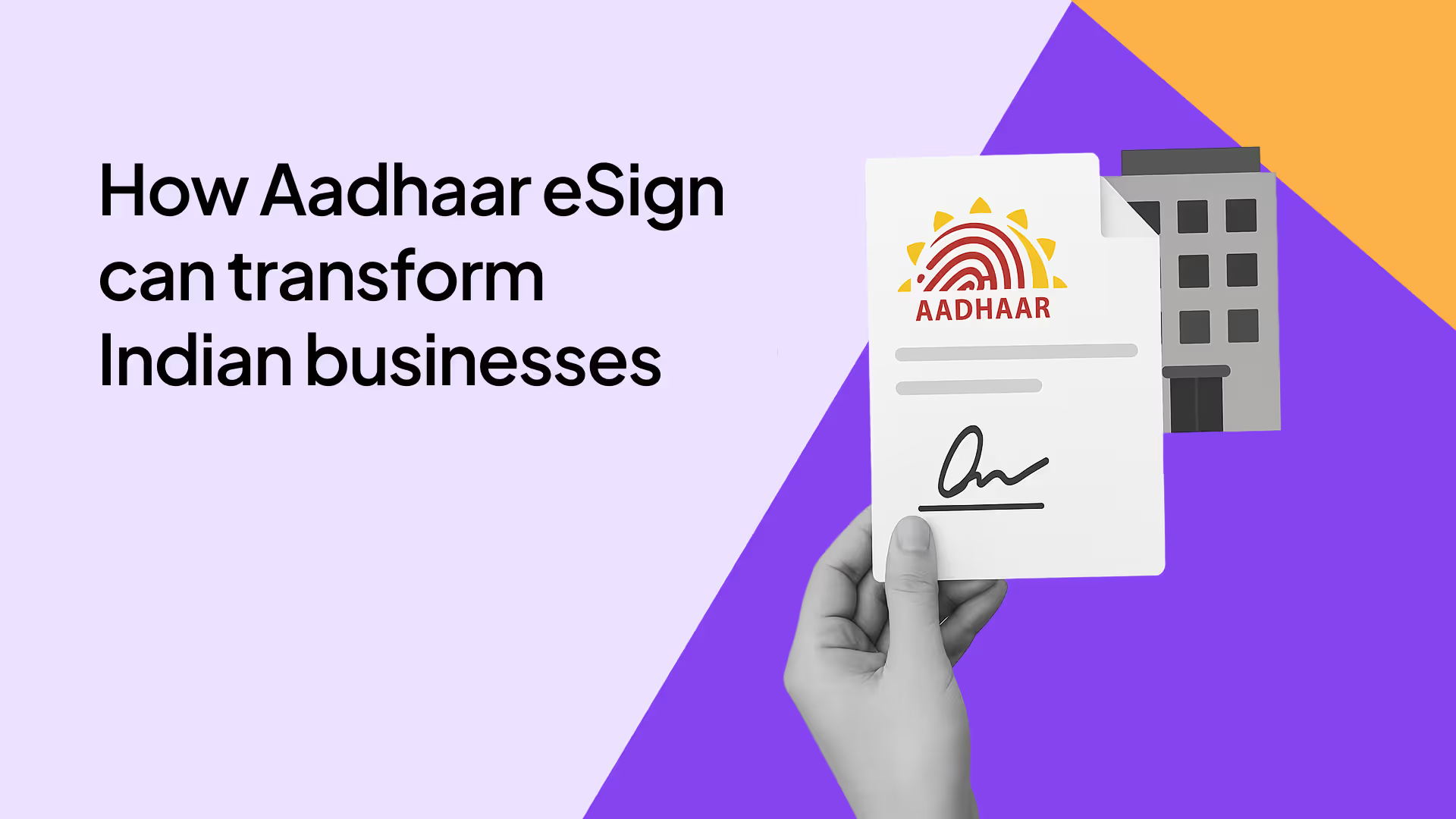(We recently did a Webinar on the Aadhaar eSign for SEBI Registered Intermediaries – well attended by industry experts. Click here to view the recording. )
SEBI’s 24 April Circular is innocuously titled – “Clarification on Know Your Client (KYC) Process and Use of Technology for KYC”. However, its implications for the industry are explosive.
A typical onboarding process for a customer with a SEBI Intermediary like an Investment Advisory Firm, Portfolio Management Service etc. involves 3 main steps:
- Manual KYC Verification
- Collection of executed and attested KYC Documents – namely KYC Forms and Officially Valid Documents (OVDs)
- Execution of onboarding documents like Demat Account Opening Form, Discretionary Portfolio Management Agreement etc.
Until now – these 3 Steps have been mostly physical – revolving around exchange of paper KYC Forms, printed OVDs, paper-based agreements and physical KYC verification.
For SEBI Intermediaries – this physical process has always been a thorn in their flesh – with multiple follow ups, pesky couriers and long turn-around times.
This thorn has become a dagger during the lockdown. With strict curbs on movement and courier transit and social distancing set to continue – these physical flows seem unsustainable.
Luckily the SEBI Circular saves the day.

What does the Circular say?
The SEBI Circular clarifies the use of two technologies to enable end-to-end digital onboarding.:
- Video KYC – to digitize Step 1– KYC verification
- Aadhaar eSign – to digitize Steps 2 and 3 – execution and attestation of OVDs, KYC Forms and onboarding documents
Digitizing Step 1 via Video KYC
For KYC verification, SEBI has permitted the use of Video In Person Verification (‘VIPV’) via a specific process:

The above procedure mandates a “live” VIPV – where intermediaries will need to maintain your KYC agent on the other end of the video in real time.
This is, in essence, a direct replication of current processes except through means of video – eliminating the need for a physical, in-person verification.
Several technologies already exist for conducting VIPV in the above prescribed manner. Check out Karza or IDfy – who provide Video KYC Solutions.
Digitizing Steps 2 and 3 via Aadhaar eSign
Aadhaar eSign – prescribed in Schedule II of the Information Technology Act – allows people to generate and affix digital signatures on the fly using just their Aadhaar number and an OTP/Biometric Authentication.
Aadhaar eSign is also affixed on multiple pages of a document or a set of documents with a single transaction.
We have written about Aadhaar eSign on previous occasions.

The Circular prescribes Aadhaar eSign as a critical component for digitizing Steps 2 and 3 of the onboarding processes, namely:
- OVD Attestation and KYC Form Signing
- Execution of Onboarding Documents
Digitizing OVD Attestation
A critical component of any KYC process is the collection of Officially Valid Documents or OVDs from the Customer. These are nothing but identification documents that a customer needs to furnish – usually government issued IDs like a PAN Card, Aadhaar Card, Driving License, Voter ID etc.
Traditional Physical Process
In the physical process – a Customer is required to:
- Hand over a photocopy of the OVD/PAN/Cancelled Cheque. The Customer will need to self-attest these documents by affixing a physical signature on each of them.
- Show the KYC agent the original copy of the OVD for verification
Digital Flow
SEBI prescribes Aadhaar eSign as a mode of attestation to digitize the OVD flow of Clause 4(ii) of the Circular:
- The customer uploads scanned copies of OVDs/PAN Cancelled Cheque – and attests them via Aadhaar eSign.
- Verify the OVD under Digilocker/eSign, Aadhaar Verification Mechanism (if OVD is Aadhaar) or IT Department PAN mechanism.

Digitizing KYC Form Attestation
Traditional Physical Process
In the traditional physical process, a customer will need to fill up the KYC form and then sign it – in multiple places. The process can be painstaking. With the Intermediary either delivering the documents to the customer via an agent, couriering the same and/or arranging for pickup after customer has signed it. This can lead to a simple process taking days, if not weeks.
Digital Flow
SEBI digitizes the KYC form through Aadhaar eSign by way of Clause 4(iv) of the Circular:
- The customer will need to either: i) Print the KYC form, scan it and upload it OR b) affix a cropped image of their signature on the KYC form;
- After Step (a) is complete and the form is filled up, the customer attests the form via Aadhaar eSign

Digitizing Onboarding Document Execution
Post KYC – most intermediaries also sign onboarding documents with their clients. These include, demat account opening forms, discretionary portfolio management agreements etc.
These documents are critical charter documents of the transaction enshrining the rights and obligations of both the investor and the intermediary.
Traditional Physical Process
In the traditional process – these documents – consisting of multiple pages must be signed on most pages by the customer. The customer cannot miss their signature on even one page where the sign is required. These documents are usually sent with the KYC form – making the process equally painstaking and time consuming.
Digital Flow
SEBI’s circular, in Clause 3(c) explicitly recognizes Section 5 of the Information Technology Act, 2000 and states that – the eSign mechanism of Aadhaar shall be accepted in lieu of wet signature on the documents provided by the investor.

Therefore, in the new digital flow – a customer can sign the entire set of onboarding documents through a simple, single Aadhaar eSign transaction.
Can intermediaries take advantage?
Until now, only stock brokers had adopted Aadhaar eSign as a mode of attestation of KYC documents (Leegality itself services several stock brokers).
Investment advisory firms, PMS Firms, Mutual Funds and Depository Participants had stayed away due to the regulatory uncertainty around Aadhaar eSign.
However, with this new circular, SEBI has made it emphatically clear that intermediaries will need to use Video KYC and Aadhaar eSign to go fully digital and paperless.
Why is digital better?

Digital onboarding is better for intermediaries:
- Quick and easy – it significantly reduces the turnaround time for beginning investment journeys with Clients – from days to mere minutes
- Secure – Physical paper is subject to the elements while digital documentation is not. Further, Aadhaar eSigned documents are secure electronic records as per the Information Technology Act and Evidence Act.
- Increases Productivity – Employees of intermediaries will spend less time in dealing with paper as going digital makes it possible to automate a significant chunk of paperwork processes
- No physical storage – Intermediaries do not need to maintain and organize physical storage of onboarding/KYC documents
- Enhanced Client experience – Intermediaries can provide their Client’s and partners an enhanced, seamless onboarding experience with no pain points – ensuring a positive start to the relationship
It remains to be seen whether Intermediaries will take advantage of these benefits.
Are you an Intermediary?
Then the following offering may interest you.
Leegality is India’s most trusted Aadhaar eSign solution – servicing top companies like Airtel Payments Bank, HDB Financial Services, Siemens Financial, Federal Bank among 200 others. We were also the execution platform of choice for the Orchid pharma insolvency – a 1100 Crore transaction signed by 22 Banks across the world. This is the highest valued transaction to be eSigned in India till date and it was done through Leegality.

Leegality’s Aadhaar eSign and Document Automation Platform with features such as – Aadhaar eSign gateway, template auto-population, sign verification and automated workflows – can power the majority of your digital onboarding journey.

The best part? You can integrate Leegality with your business with no installation – in less than a week!
Give us a spin. Try a free eSign here to experience the cutting edge slickness of our eSign interface.
If you like what you see – contact us to digitally transform your onboarding processes.
.avif)


